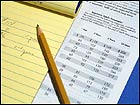|
Funds have no tax pain
|
 |
October 30, 2001: 7:23 a.m. ET
Few mutual funds will distribute capital gains this year.
By Stan Luxenberg
|
NEW YORK (CNNmoney) - Investors may be facing the worst year in mutual fund history, but there is one tiny bit of good news that should make them feel a little better: they won't get slapped with a big tax bill.
Since few mutual funds have recorded any gains at all this year, few will be issuing capital-gains distributions to shareholders. That also means new investors don't need to worry about the timing of their stock fund purchases for the rest of 2001.
"Funds have been reporting big losses, so most investors won't have to worry about paying taxes on capital gains," says Sheldon Jacobs, editor of the newsletter No-Load Fund Investor.
The year-end tax whammy
Financial pros have long warned investors to be wary of buying mutual funds during the fourth quarter of the year.
Capital gains occur when funds sell securities and record profits. Under the law, funds must distribute nearly all their gains each year to shareholders who pay taxes on the profits. Many funds make the distributions once or twice a year, typically in November or December. Most investors pay little attention to the distributions, automatically reinvesting them, but it is hard to ignore the tax consequences.
Say the distribution record date is Dec. 15. Anyone who owns shares on that day must pay capital gains tax bills. If you bought the fund on Dec. 14, you would owe taxes, even if the profits were the result of trades that happened months earlier. The gains benefited other shareholders, but you would be stuck with part of the tax bill.
How can you avoid the problem? Wait until Dec. 16 to buy the fund.
Funds don't know the exact amount of the distribution until shortly before what's called the "record date," but many provide estimates of year-end totals beginning in October.
To find out the likely tax bill you face, check a fund's Web site or call the toll-free line. So far, most companies are projecting scant gains. Vanguard reports that 70 percent of its funds aren't likely to report any gains. Invesco, a company with many growth funds that have suffered sharp declines lately, estimates that most of its funds will pay out distributions equal to less than 1 percent of assets.
At the height of the 1990's bull market, many funds racked up sizable returns and distributed capital gains that were equal to more than 10 percent of their net assets. With long-term capital gains taxed at a maximum rate of 20 percent, the tax bill was significant for many investors.
Few fund winners - but don't get caught with a bill
This year, nearly every category of funds is in the red, but there have been a few exceptions.
Some real estate funds have stayed in the black, and Fidelity Real Estate Investment reports it should distribute about 4.8 percent of assets. With medical stocks rising for part of the year, Vanguard Health Care estimates it will pay 4 percent.
To decide whether to postpone buying a fund until after the distribution date, you must consider if the shares can rise enough in the next two months to cover the tax bill. Such forecasts are hard to make.
"There is no reliable rule on how to make the calculations," says Peter Di Teresa, an analyst with Morningstar. "But if the tax bill is going to be sizable, you may want to postpone the purchase."
Tax bills were particularly painful for 2000, when some funds lost money and still saddled investors with big capital gains. For example, Credit Suisse Warburg Pincus Japan Small Company lost 71.8 percent for the year, yet reported a taxable distribution equal to 55 percent of its assets.
A series of mishaps created the problem. The fund achieved huge gains in previous years, but when the Japanese market fell last year, shareholders bolted, pulling money out of Warburg Pincus. To raise the cash, the fund sold stocks that had declined but were still well above their purchase prices. This resulted in capital gains. The tax bills wound up in the laps of the few remaining shareholders who stayed around for the distribution record date.
Schwab stings Baron fund
This year, most funds have not suffered massive withdrawals. Still, a few losing funds will report gains. Baron Asset, which is down 22.9 percent for the year, estimates that it will pay 5 percent to 10 percent of its assets as a distribution. At the beginning of this year, the fund had more than 10 percent of its assets in stock of Charles Schwab, many of the shares bought at low prices years ago. Convinced that the broker's stock had gotten too expensive, portfolio manager Ron Baron decided to dump half his stake and book the profit.
The big tax bills will likely catch many Baron investors by surprise. The fund typically buys and holds stocks for years. Because it rarely books capital gains, Baron Asset generally saddles investors with only small bills on April 15. But the performance this year should serve as a reminder that funds can produce sizable tax bills, sometimes when investors least expect them.
-- Stan Luxenberg is a freelance writer for CNN Money. 
* Disclaimer
|
|
|
|
|
 |

|

